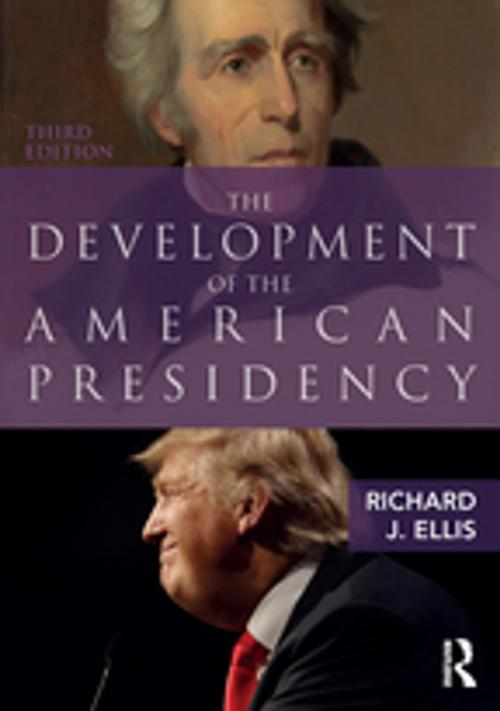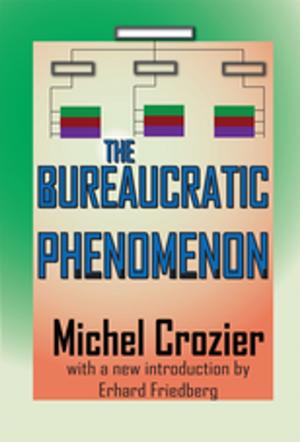| Author: | Richard J. Ellis | ISBN: | 9781351708562 |
| Publisher: | Taylor and Francis | Publication: | February 20, 2018 |
| Imprint: | Routledge | Language: | English |
| Author: | Richard J. Ellis |
| ISBN: | 9781351708562 |
| Publisher: | Taylor and Francis |
| Publication: | February 20, 2018 |
| Imprint: | Routledge |
| Language: | English |
A full understanding of the institution of the American presidency requires us to examine how it developed from the founding to the present. This developmental lens, analyzing how historical turns have shaped the modern institution, allows for a richer, more nuanced understanding. The Development of the American Presidency pays great attention to that historical weight but is organized by the topics and concepts relevant to political science, with the constitutional origins and political development of the presidency its central focus. Through comprehensive and in-depth coverage, Richard Ellis looks at how the presidency has evolved in relation to the public, to Congress, to the executive branch, and to the law, showing at every step how different aspects of the presidency have followed distinct trajectories of change. Each chapter promotes active learning, beginning with a narrative account of some illustrative puzzle that brings to life a central concept. A wealth of photos, figures, and tables allow for the visual presentations of concepts.
New to the Third Edition
Analysis of the 2016 election, including the role of the Electoral College and implications of Trump’s nomination for the "party decides" thesis;
Exploration of Trump’s Twitter presidency and the effectiveness of using social media to bypass the Washington press corps;
In-depth coverage of the development of twentieth-century president–press relations, including a new section on broadcasting the presidency that explores the development of the presidential press conference and presidents’ use of radio and television;
Study of national security policy in the Obama administration, with a special focus on the targeted killing of American citizens and Obama’s legacy for presidential war powers;
Examination of the original understanding and contemporary relevance of impeachment as well as updated discussion of the president’s pardon power;
Discussion of recent developments in the legislative and legal realms, including Trump’s first hundred days, the Garland–Gorsuch episode, and abolition of the filibuster for Supreme Court appointments;
Preliminary assessment of Trump’s place in historical time.
A full understanding of the institution of the American presidency requires us to examine how it developed from the founding to the present. This developmental lens, analyzing how historical turns have shaped the modern institution, allows for a richer, more nuanced understanding. The Development of the American Presidency pays great attention to that historical weight but is organized by the topics and concepts relevant to political science, with the constitutional origins and political development of the presidency its central focus. Through comprehensive and in-depth coverage, Richard Ellis looks at how the presidency has evolved in relation to the public, to Congress, to the executive branch, and to the law, showing at every step how different aspects of the presidency have followed distinct trajectories of change. Each chapter promotes active learning, beginning with a narrative account of some illustrative puzzle that brings to life a central concept. A wealth of photos, figures, and tables allow for the visual presentations of concepts.
New to the Third Edition
Analysis of the 2016 election, including the role of the Electoral College and implications of Trump’s nomination for the "party decides" thesis;
Exploration of Trump’s Twitter presidency and the effectiveness of using social media to bypass the Washington press corps;
In-depth coverage of the development of twentieth-century president–press relations, including a new section on broadcasting the presidency that explores the development of the presidential press conference and presidents’ use of radio and television;
Study of national security policy in the Obama administration, with a special focus on the targeted killing of American citizens and Obama’s legacy for presidential war powers;
Examination of the original understanding and contemporary relevance of impeachment as well as updated discussion of the president’s pardon power;
Discussion of recent developments in the legislative and legal realms, including Trump’s first hundred days, the Garland–Gorsuch episode, and abolition of the filibuster for Supreme Court appointments;
Preliminary assessment of Trump’s place in historical time.















